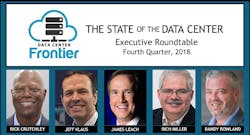Executive Roundtable: Data Center Trends to Watch for 2019
Welcome to our 13th Data Center Executive Roundtable, a quarterly feature showcasing the insights of thought leaders on the state of the data center industry, and where it is headed. In our Fourth Quarter 2018 roundtable, we examine four topics: the top trends for the industry in 2019, the challenges in staffing and talent acquisition for data centers, which geographic markets we should be watching in 2019, and the state of IT security and the role of the data center.
Here’s a look at our distinguished panel:
- James Leach, Vice President of Marketing at RagingWire Data Centers.
- Rick Crutchley, Vice President and General Manager for North America at Iron Mountain Data Centers.
- Randy Rowland, President – Data Center Services at Cyxtera Technologies.
- Jeff Klaus, General Manager of Intel Data Center Software Solutions at Intel Corp.
The conversation is moderated by Rich Miller, the founder and editor of Data Center Frontier. Each day this week we will present a Q&A with these executives on one of our key topics. We begin with a look at our panelists’ picks for the top trends to watch in 2019.
Data Center Frontier: What is the one trend you believe will be most significant in shaping the data center industry in 2019, and why?
JAMES LEACH, RagingWire Data Centers
James Leach: In 2019, we expect to see the largest data center users, including hyperscale cloud companies and enterprises, optimizing their data centers on a worldwide basis. Increasingly, they will want to partner with a handful of global data center providers that can meet their capacity requirements today and in the future. In this new business model, data center colocation become a critical link in the IT supply chain.
As part of NTT, we have spent years developing a global data center platform that currently extends to 20 countries. What does it mean to be a global data center company? We see the key elements being data center design and engineering, supply chain, operations, capacity, and organizational structure.
Data center buyers are looking for consistent, global design standards for power, cooling, telecommunications, cloud connectivity, and security. They value a robust supply chain that delivers infrastructure components on time, at competitive prices, and with flexibility to ship to construction sites around the world based on adjusted construction schedules. For operations, global data center companies need common procedures, documentation, and talent management. Capacity should be deployed and managed globally with the flexibility to move application workloads as required. Finally, the organization must be structured to run as a global business with an integrated management and go-to-market model. This framework makes it possible for customers to build and manage a worldwide data center portfolio with streamlined resources and at a lower cost.
RICK CRUTCHLEY of Iron Mountain.
Rick Crutchley: Data center modernization. To meet end-user demand that is intolerant of anything less than digital perfection, new applications will produce heavier workloads than ever in 2019. The resulting data set must be transferred over an increasingly complex network of in-house, multi-cloud and other outsourced IT resources.
This creates material risks associated with performance, security and information governance that will manifest in the form of data center modernization – upgrades to existing facilities and/or the increased selection of colocation as the preferred data center solution.
RANDY ROWLAND, President of Data Center Services at Cyxtera
Randy Rowland: In 2019, the most significant trend shaping the industry will be the on-demand data center. Enterprises will continue their move beyond enterprise data centers in their race to deliver hybrid IT “as a service.” As a result, IT leaders will look for more viable alternatives to support workloads not fit for cloud.
To keep pace with this demand, enterprises will look to data center providers for a way to balance agility with control, such as the ability to provision software-defined connectivity and dedicated hyperconverged infrastructure (HCI). The on-demand data center will also need to provide quick and easy access to a diverse ecosystem of network and service providers.
JEFF KLAUS, General Manager of Intel Data Center Management Solutions
Jeff Klaus: Artificial intelligence and its role in data center optimization. Data Center management requires a lot of process work, but the data collection and analysis has been an area where we have had less than stellar growth. I think that will be seen as a gap as IT professionals start seeing how others areas continue to leverage data sciences.
NEXT: The challenges in staffing and talent acquisition for data centers.
Keep pace with the fact-moving world of data centers and cloud computing by following us on Twitter and Facebook, connecting with me on LinkedIn, and signing up for our weekly newspaper using the form below:
About the Author






